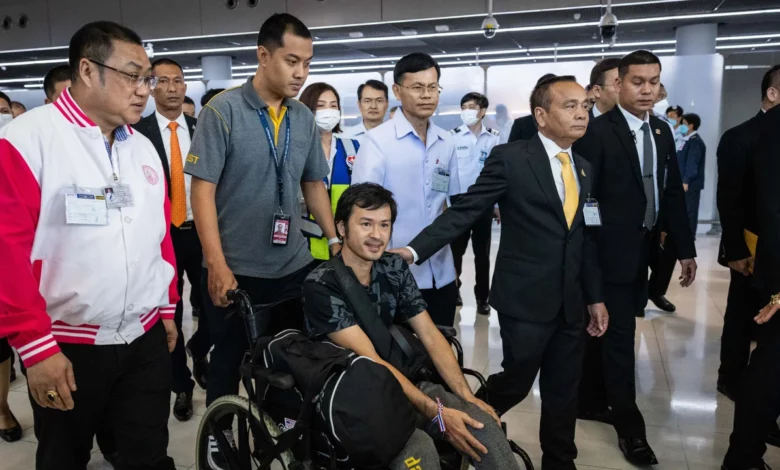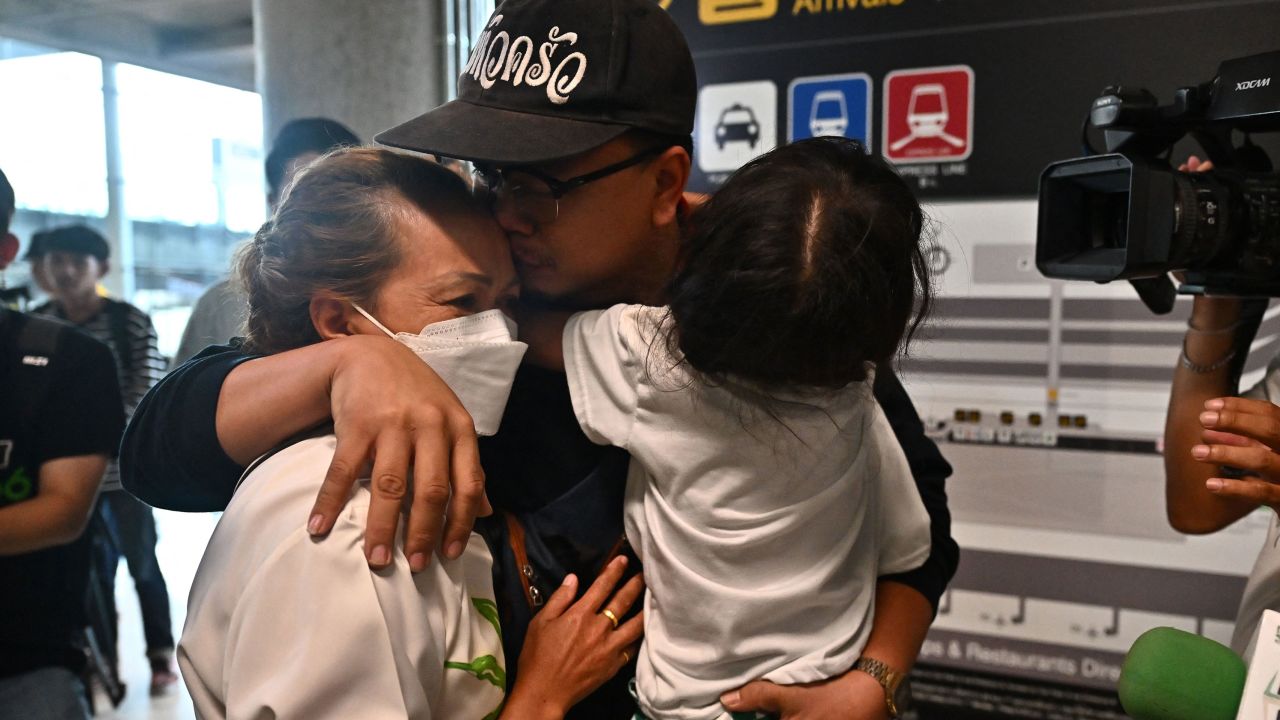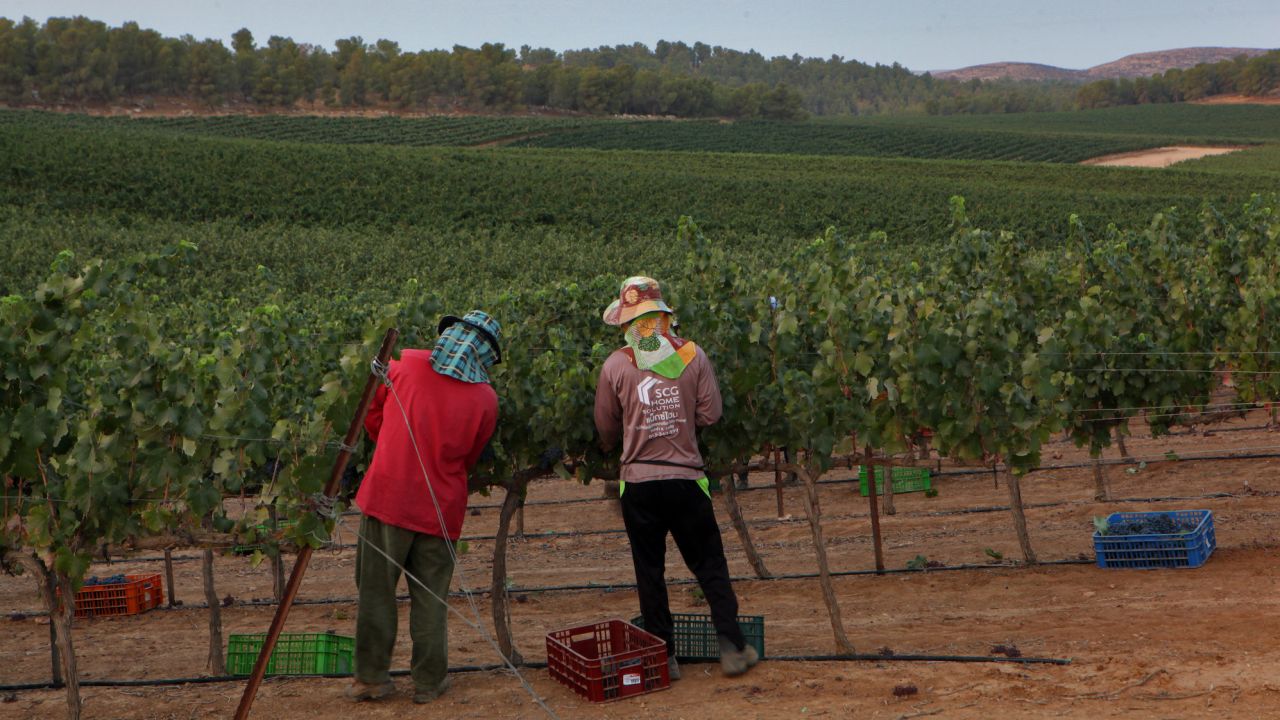
Jobs were hard to come by within his rural community so when Manee found a cleaning position at a government office in southern Israel near the Gaza it seemed like a real opportunity.
He’d been working that job for nearly five years when he was abducted and taken hostage last weekend by Hamas militants involved in last weekend’s murder and kidnapping rampage within Israel.
The 29-year-old was just one of the scores of foreigners who became caught up in the attack that has devastated families around the world.
Dozens came from countries like the United States, Canada, the UK and France, with many holding dual Israeli citizenship and living in the kibbutzim targeted by Hamas gunmen or had been partying at the music festival where so many were killed.
But among many of the foreigners killed and captured by Hamas were also migrant workers from Asia, without familial links to either Israel or the Palestinian Territories, who hail from mostly poor, rural families and work in the country’s agricultural, construction and healthcare sectors.
At least 10 Nepali agriculture students were killed when the Hamas militants stormed the Alumim kibbutz, an agrarian community near Gaza, and another Nepali is missing, the country’s ambassador to Israel told CNN.
Two Filipinos were also killed, according to the Philippines government.
But it is Thailand, which for decades has made up one of the biggest sources of migrant labor in Israel, that has suffered one of the highest tolls of any nation beyond Israel itself.
So far at least 21 Thai nationals have been killed as of Thursday, according to Thai authorities, with at least 14 others believed to have been captured by Hamas, their current whereabouts unknown, Prime Minister Srettha Thavisin confirmed.
“Thailand has dominated the foreign migrant worker market in Israeli agriculture for the past decade,” said Phil Robertson, Deputy Asia Director at Human Rights Watch.
“As many as 20,000 Thai workers were living on various remote farms and desert areas all over Israel, including areas close to the Gaza Strip so it isn’t surprising at all that many were right in harm’s way when Hamas fighters arrived.”
Each day this week the number has ticked up as more details become known, sparking fresh heartbreak for Thai families living thousands of miles from the Middle East’s latest conflict.

In an interview on Thai television, Labour Minister Phiphat Ratchakitprakarn said that around 5,000 Thais were employed in the “fighting zone.” Thousands of them are now hoping to return home to worried families, he added.
With Israel massing hundreds of thousands of troops on the Gaza border amid speculation there could be a ground invasion, many in Thailand fear they could yet become caught in the crossfire.
‘Begging for my son’s release’
Manee had talked to his father Chumporn on the phone just hours before the attack.
“I had spoken with Manee in the morning and we were supposed to talk again in the evening,” Chumporn told CNN in a phone interview.
At the time, rockets were being fired toward Israel and this reminded the elder man of his own experiences living and working there. Aware of how quickly the dangers could escalate, the 50-year-old urged his son not to go outside, other than to find a bunker and hide if he needed to.
But hours later, he saw photos circulating on social media showing his son with his hands behind his back, sitting barefoot and cross-legged with other male hostages in front of an armed fighter pointing a rifle.
The photo, verified by Chumporn and seen by CNN, showed what looked like an underground room.
“I couldn’t believe it. I thought it was some kind of prank,” Chumporn said. “I called him several times but there was no answer – that was when I started to believe it was real.”
“We (Thais) are not involved in any of the conflict between Israel and Palestine. We are just there to work and earn money so we can have better lives,” he added.
“I am begging for my son’s release. I need to have him back, in good shape – like before he left Thailand.”

‘Palestinian workers weren’t welcome anymore’
Migrant workers from Asia make up more than half of Israel’s foreign work force, often taking on jobs as caregivers and within the construction industry.
Construction workers from China, where multiple firms maintain lucrative contracts with real estate developers in Israel, have found themselves caught up the violence this week.
One of the Filipinos killed, Paul Castelvi, had been working in Israel for five years and was a major breadwinner for his family, who expressed disbelief over his death at the hands of Hamas fighters.
“He was among those employed taking care of elderly people when Hamas fighters entered their home,” Castelvi’s elderly father Nick told CNN affiliate CNN Philippines at their home in San Fernando city in the northwestern Pampanga province.
“They were heartless and did not show any mercy.”
“You can ask anyone and they will tell you how kind and good my son was. He (would have) put up a fight to defend his employer and was shot there while they (Hamas fighters) took his employer and left Paul there to die with a gunshot wound,” he said, breaking down in tears.
“We are left devastated by his loss. He was just there to earn a living so why would they do that to my son?”
Assia Ladizhinskaya, spokesperson for Kav LaOved, a non-profit advocating for labor rights in the region, said part of the reason for this was that an earlier “massive wave of terror acts in Israel” meant “Palestinian workers weren’t welcome anymore.”
“During the 1990s, migrant workers (began to) replace Palestinians working in construction sites and agriculture fields as Palestinians workers became unwelcome and ‘unreliable’ due to regular lock downs and security issues,” Ladizhinskaya added.
Now many have found themselves caught up in those same security issues as a seemingly intractable conflict that has festered for decades without resolution flares up once more.
Human Rights Watch called for the “immediate and unconditional release” of all hostages and said that Thai workers, along with Nepalese and Filipinos, “were simply there to earn money to support their families.
“Such targeting of civilians is clearly a war crime and inexcusable in any circumstance,” said Robertson.
‘Survivors return home’
Meanwhile, the first flight of 41 Thai landed in Bangkok on Thursday – many recounting harrowing escapes as they reunited with tearful family members. Agency photos and videos showed two were being through the airport in wheelchairs.
Migrant workers migrating to dangerous conflict zones in search of work, with little protection and legal enforcement, has been a “big issue for decades,” said British researcher and migrant worker rights specialist Andy Hall.
“It’s clear there is a strong market for them and little regulation by governments,” Hall told CNN. Many even pay massive amounts of money as part of high recruitment fees to take up jobs, he added.
Thailand itself is a major destination for migrant workers, mainly from poorer neighboring countries like Cambodia and Laos, as well as war-torn Myanmar.
“It only shows the desperation of the situation and stronger protocols are needed to protect people even before they migrate. There needs to be more risk assessments and detailed consideration (on the part of authorities).”
For now, many of those workers in Israel find themselves trapped in a region described by the UN as at a “tipping point” as tensions escalate and Israeli retaliation against Gaza accelerates.
Then there are those who, like Manee Jirachart, find themselves hostage in a foreign land they hoped would help them have a better life.
There are up to 150 hostages being held in Gaza, Israeli authorities believe. It is unclear how many are foreign nationals.
“Scores are being held captive, facing appalling threats to their lives,” said the UN’s top humanitarian official Martin Griffiths in a statement released this week.
“The violence must stop. Those held captive must be treated humanely. Hostages must be released without delay.”
With additional reporting from CNN’s Kathleen Magramo and Xiaofei Xu.




